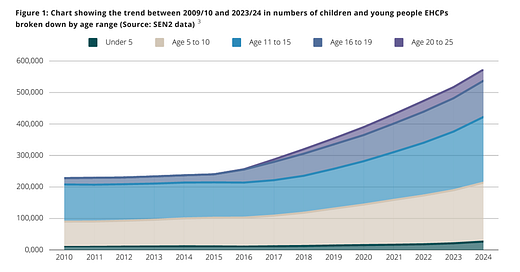A few weeks ago Kemi Badenoch’s campaign released a paper called “Conservatism in Crisis: Rise of the Bureaucratic Class”. Though it sounds like a particularly dull instalment in the Transformers franchise, it’s worth reading as an eye-opening introduction to her worldview.
The core argument is that there is a growing “bureaucratic class” made up of people working in sectors like HR, compliance, and the law, who have an interest in making government bigger to give themselves more to do and hold more organisational power. As such they are a drag on growth, and a political problem for the Conservatives as they will support left-wing parties. For reasons that are not entirely clear they are also, according to the paper, more likely to embrace identity politics and dislike the idea of the nation state.
There are some rather obvious flaws with this argument. For one these sectors, while they have grown, are still a small part of the workforce. Plus the rise in regulation is clearly multi-causal. There may be some bureaucratic mission creep, but we’ve also had a financial crisis and Brexit, both of which have led to more compliance requirements, and much unncessary regulation is the responsibility of government that finds it hard to say no to popular media-led campaigns.
As for hating the nation state I see no evidence whatsoever that people doing these kinds of jobs are unusually unpatriotic or keen on open borders. These are extremely marginal views. If “the bureaucratic class” doesn’t vote Conservative it’s because almost no one of working age does – whatever type of work they do.
In summary, when assigning blame for the failures of recent decades I would allocate a lot more to Badenoch’s government than people working in HR.
But I was particularly struck by a section on another supposed tool of the bureaucratic class: “the socialisation of mental health”. Which according to the paper means that:
“Mental health [has] moved from something that people worked on for their own benefit, to something where everyone [has] to treat you differently, [which] has both created costs and failed to improve people’s mental health outcomes.”
This has been exacerbated, the paper argues, by giving more protections and benefits to those with mental health conditions and so making embracing “fragility” more attractive than being resilient. Which takes us to the following section:
“Being diagnosed as neuro-diverse was once seen as helpful as it meant you could understand your own brain, and so help you to deal with the world. It was an individual focused change. But now it also offers economic advantages and protections. If you have a neurodiversity diagnosis (e.g. anxiety, autism), then that is usually seen as a disability, a category similar to race or biological sex in terms of discrimination law and general attitudes.
If you are a child, you may well get better treatment or equipment at school – even transport to and from home. If you are in the workforce, you are protected in employment terms from day 1, you can more easily claim for unfair dismissal, and under disability rules you can also require your employer makes ‘reasonable adjustments’ to your job (and you can reveal your disability once you have been employed rather than before).”
This is somewhat confused. Autism is not a mental illness but a developmental disorder. Anxiety is not a form of neurodivergence. And while it’s true there are legal disability protections it’s hardly a golden ticket to riches given that only 3 in 10 autistic people of working age are in employment.
It’s the line about children that particularly stood out, though, because it relates to the biggest single problem facing the new team at the Department for Education: the spiralling cost of special educational needs. To a significant degree, this is being driven by an increase in high cost support for autistic pupils.
In the rest of the post I’ll set out the scale of this problem, why Badenoch (and others) belief that it is due to cultural shifts is a dangerous misdiagnosis, and how the government might think about dealing with the real causes.
Keep reading with a 7-day free trial
Subscribe to Comment is Freed to keep reading this post and get 7 days of free access to the full post archives.



